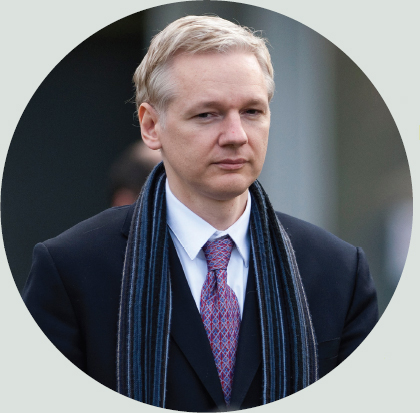Democracy and Reimagining Journalism’s Role
Journalism is central to democracy: Both citizens and the media must have access to the information that we need to make important decisions. As this chapter illustrates, however, this is a complicated idea. For example, in the aftermath of 9/11, some government officials claimed that reporters or columnists who raised questions about fighting terrorism, invading Iraq, or developing secret government programs were being unpatriotic. Yet the basic principles of democracy require citizens and the media to question our leaders and government. Isn’t this, after all, what the American Revolution was all about? (See “Examining Ethics: WikiLeaks, Secret Documents, and Good Journalism” on page 506.)
Conventional journalists will fight ferociously for the principles that underpin journalism’s basic tenets—
Social Responsibility
Although reporters have traditionally thought of themselves first and foremost as observers and recorders, some journalists have acknowledged a social responsibility. Among them was James Agee in the 1930s. In his book Let Us Now Praise Famous Men, which was accompanied by the Depression-
Agee also worried that readers would retreat into the comfort of his writing—
EXAMINING ETHICS
WikiLeaks, Secret Documents, and Good Journalism
Since its inception in 2006, the controversial Web site WikiLeaks has released millions of documents—
In its most controversial move, in 2010 WikiLeaks offered 500,000-
WikiLeaks presents a number of ethical dilemmas and concerns for both journalists and citizens. News critic and journalism professor Jay Rosen has called WikiLeaks “the world’s first stateless news organization.”3 But is WikiLeaks actually engaging in journalism—

Carl Court/AFP/Getty Images
Examining Ethics Activity
As a class or in smaller groups, consider the ethical concerns laid out above. Following the ethical template outlined on page 19 in Chapter 1, begin by researching the topic, finding as much information and analysis as possible. Read Bill Keller’s New York Times Magazine piece, “The Boy Who Kicked the Hornet’s Nest” (January 30, 2011), or his longer 2011 Times report, “Open Secrets: WikiLeaks, War and American Diplomacy” (www.nytimes.com/
Next, based on your research and informed analysis, decide whether WikiLeaks is a legitimate form of journalism and whether there should be newsroom policies that restrict the release of some kinds of documents when in partnership with a resource like WikiLeaks (such as the “War Logs” project described here). Create an outline for such policies.
Deliberative Democracy
According to advocates of public journalism, when reporters are chiefly concerned with maintaining their antagonistic relationship to politics and are less willing to improve political discourse, news and democracy suffer. The late Washington Post columnist David Broder thought that national journalists like him—
Public journalism offers people models for how to deliberate in forums, and then it covers those deliberations. This kind of community journalism aims to reinvigorate a deliberative democracy in which citizen groups, local government, and the news media work together more actively to shape social, economic, and political agendas. In a more deliberative democracy, a large segment of the community discusses public life and social policy before advising or electing officials who represent the community’s interests.
In 1989, historian Christopher Lasch argued that “the job of the press is to encourage debate, not to supply the public with information.”48 Although he overstated his case—
As the advocates of public journalism acknowledged, people had grown used to letting their representatives think and act for them. Today, more community-
Arguing that for too long journalism has defined its role only in negative terms, news scholar Jay Rosen notes: “To be adversarial, critical, to ask tough questions, to expose scandal and wrongdoing . . . these are necessary tasks, even noble tasks, but they are negative tasks.” In addition, he suggests that journalism should assert itself as a positive force, not merely as a watchdog or as a neutral information conduit to readers but as “a support system for public life.”49